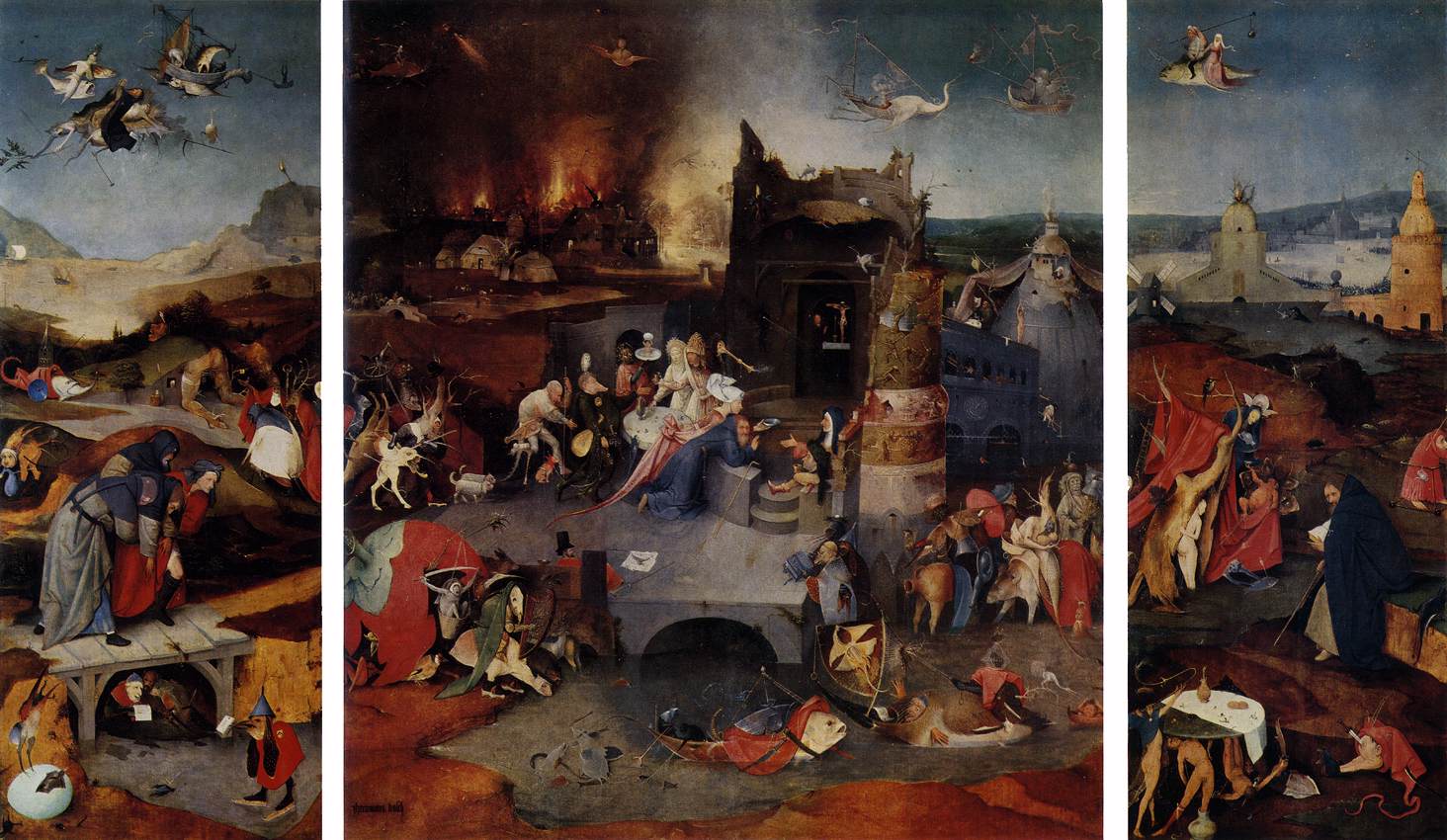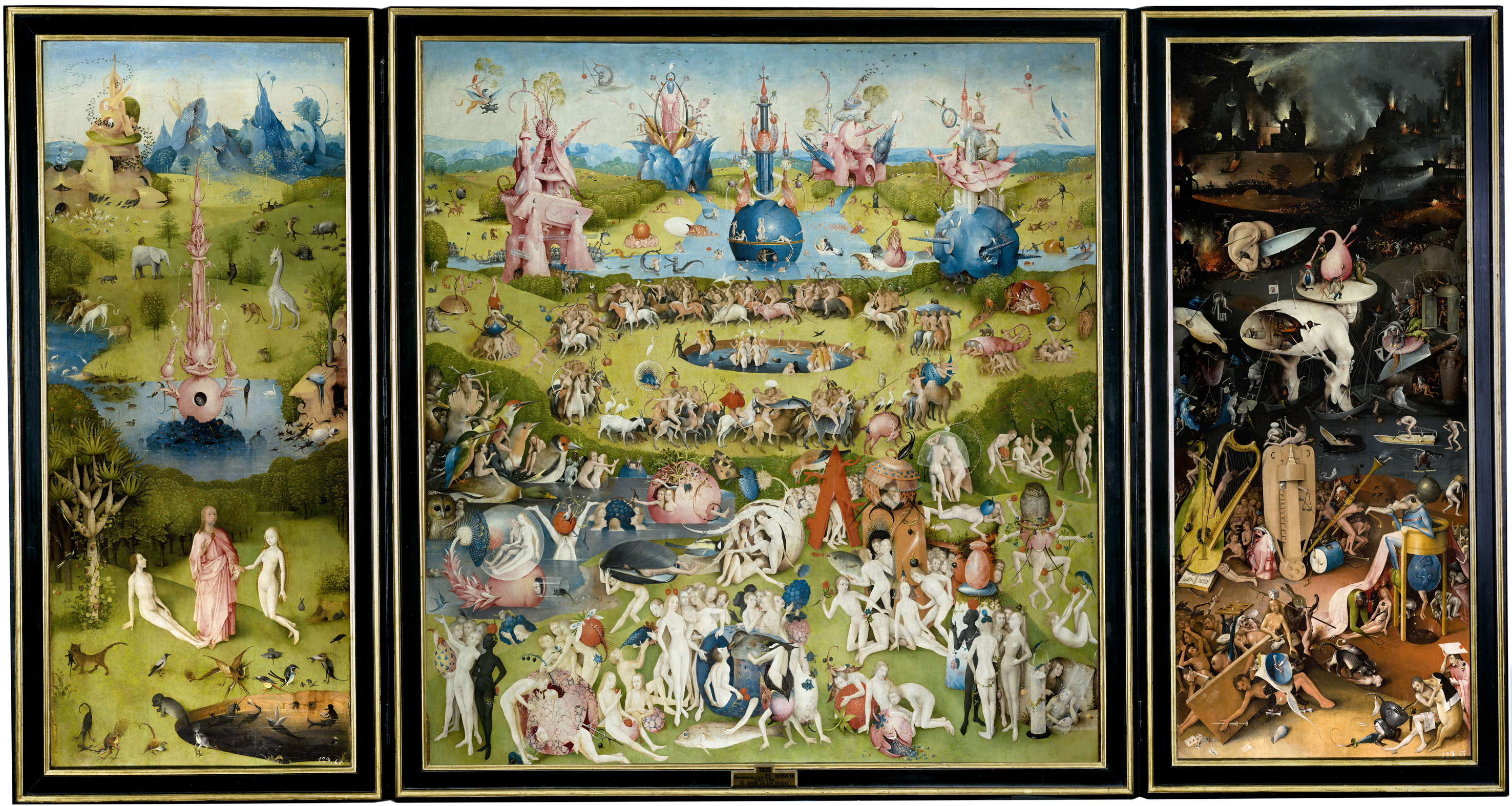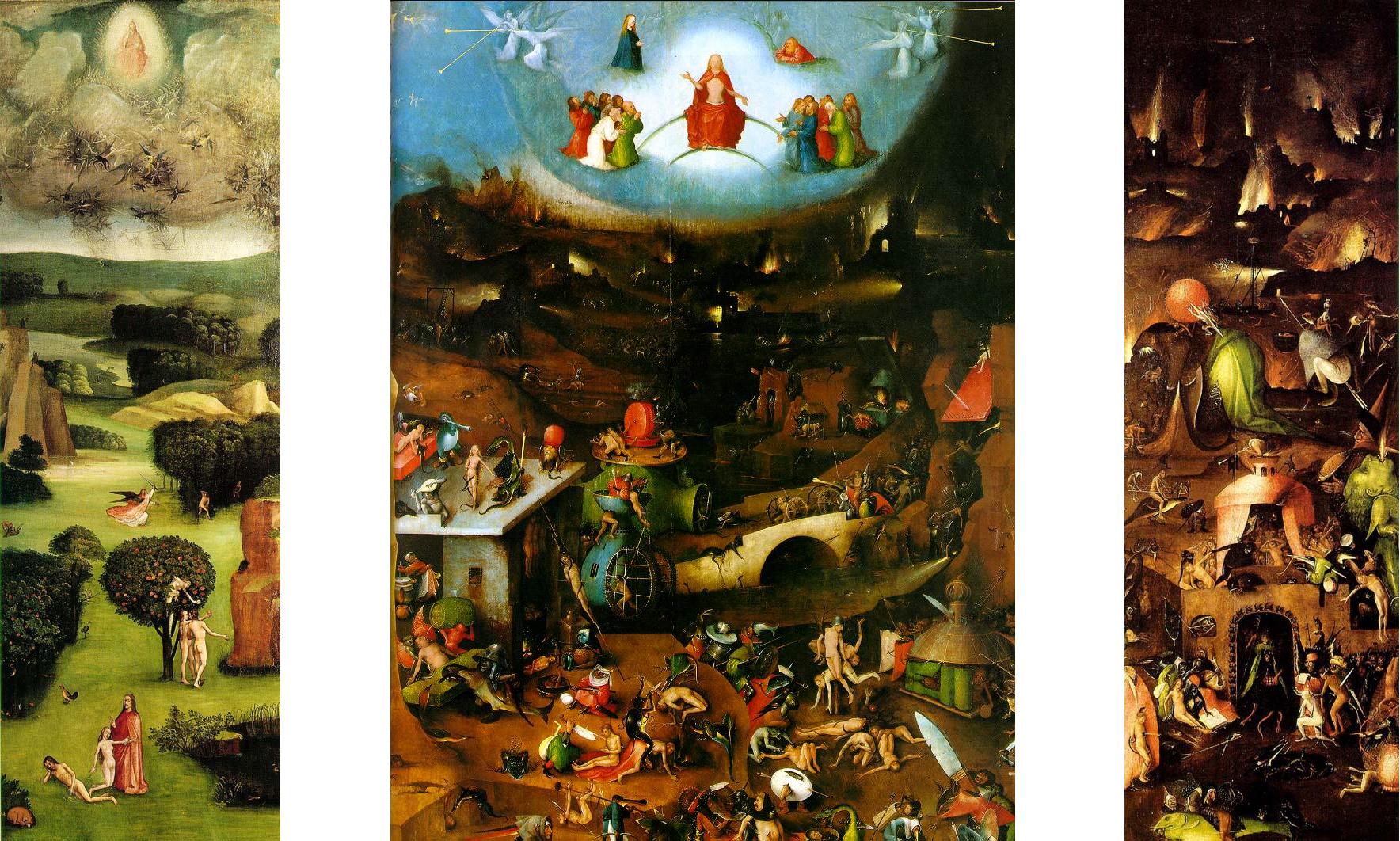Alan Watts on Money and the Stock Market
 Tuesday, February 6, 2018 at 02:58PM
Tuesday, February 6, 2018 at 02:58PM The following excerpts are from the The Veil of Thoughts, an Alan Watts lecture which explores how ideological and economic abstractions impact humanity, the natural world, and ourselves. I’ve transcribed the first part of the lecture, in which Watts talks about money, the Great Depression, and the stupidity of American congressmen. For the sake of adding some color to this entry, I've included three triptychs painted over 500 years ago by the incredible Netherlandish painter Hieronymus Bosch.
 Triptych of the Temptation of St. Anthony, Hieronymus Bosch
Triptych of the Temptation of St. Anthony, Hieronymus Bosch
The subject of this seminar is The Veil of Thoughts, and following out the theme that somebody once suggested by saying that thought is a means of concealing truth, despite that fact that it’s an extraordinarily useful faculty. But in quite recent weeks we’ve have an astounding example of the way mankind can be bamboozled by thoughts. There was a crisis about gold, and the confusion of money in any form whatsoever with wealth is one of the major problems from which civilization is suffering. Because way back in our development, when we first began to use symbols to represent the event of the physical world, we found this such an ingenious device that we became completely fascinated with it, and in ever so many different dimensions of life, we are living in state of total confusion between symbol and reality. And the real reason why in our world today where there is no technical reason whatsoever why there should be any poverty at all; the reason it still exists is people keep asking the question, “Where’s the money going to come from?” Not realizing that money doesn’t come from anywhere and never did, except if you thought it was gold. And then of course if to increase the supply of gold and use that to finance all the world’s commerce – prosperity would depend not upon finding new processes for growing food in vast quantities, or getting nutrition out of the ocean, or getting water from atomic energy – no, it depends on discovering a new gold mine, and you can see what a nonsensical state of affairs that is, because when gold is used for money it becomes, in fact, useless. Gold is very useful metal if filling teeth, making jewelry, and maybe covering the dome of the capitol in Washington. But the moment it is locked up in vaults in the form of ingots it becomes completely useless. It becomes a false security; something that people cling to like and idol, like a belief in some kind of “Big Daddy Oh God” with whiskers who lives above the clouds. And all that kind of thing diverts our attention from reality, and we go through all sorts of weird rituals; and the symbol, in other words, gets in the way of practical life…
 The Garden of Earthly Delights, Hieronymus Bosch
The Garden of Earthly Delights, Hieronymus Bosch
Do you remember the Great Depression? When one day everybody was doing business and things were going along pretty well, and the next day there were breadlines. It was like someone came to work and they said to him, “Sorry, chum, but you can’t build today. No building can go on, we don’t have enough inches.” He said, “What do mean we don’t have enough inches? We’ve got wood haven’t we? We’ve got metal, we’ve even got tape measures!” He said, “Yeah, but you don’t’ understand the business world, we just haven’t got enough inches – just plain inches – we’ve used too much of them.” And that’s exactly what happened when we had the depression, because money is something of the same order of reality as inches, grams, meters, pounds, or lines of latitude or longitude. It is an abstraction. It is a method of bookkeeping to obviate the cumbersome procedures of barter. But our culture, our civilization is entirely hung up on the notion that money has an independent reality of its own. And this is a very striking, concrete example of what I’m going to talk about. Of the way we are bamboozled by our thoughts, which are symbols, and what we can do to become unbamboozled, because it’s a very serious state of affairs. Most of our political squabbles are entirely the result of being bamboozled by thinking, and it is to be noted that as time goes on the matters about which we fight with each other are increasingly abstract. The wars fought about abstract problems get worse and worse. We are thinking about vast abstractions – ideologies called communism, capitalism, all these systems, and paying less and less attention to the world of physical reality, to the world of Earth and trees and waters and people, and so are, in the name of all sorts of abstractions, busy destroying our natural environment. Wildlife for example is having a terrible problem continuing to exist alongside human beings. Another example of this fantastic confusion is that not so long ago the Congress voted a law imposing stern penalties upon anyone who should presume to burn the American flag. And they put this law through with a great amount of patriotic oratory and the quoting of poems and so on about Old Glory, ignoring the fact entirely that these same Congressmen, by acts commission or omission, are burning up that for which the flag stands. They are allowing the utter pollution of our waters, of our atmosphere, the devastation of our forests and the increasing power of the bulldozer to bring about a ghastly fulfillment of the biblical prophecy that every valley should be exalted, every mountain laid low and the rough places plain. But you see, they don’t see, they don’t notice the difference between the flag and the country, or as Korzybski pointed out, “the difference between the map and the territory."
From "Money, Guilt, and the Machine:"
The great banks of the world at one time got absolutely sick of the expense and security measures involved in shipping consignments of gold from one bank to another and so they decided that all the chief banks of the world would open offices on a certain island in the South Pacific which was balmy and comfortable and there they would store all the gold in the world. And they put it in great subterranean vaults reached by deep elevator shafts and then all they had to do when one bank, one country owed gold to another was to trundle it across the street. And this was very efficient. It went on beautifully for five or six years. And then the presidents of the world banks got together and said, "Let's have a convention out on this island and take our wives and families.”
So about seven years from the date of opening, all those presidents and their wives and families went out to this Pacific island and they inspected the books. And everything was beautifully in order. Then the children said, "Oh Daddy can't we see the gold?" They said, "Of course you may see the gold." And they said to the managers, "Let's take our children down to the vaults and show them the gold."And the manager said, "Well it's a... it's a little bit inconvenient at this time and perhaps the children would not really be very interested, after all it's just only old plain gold." And the president said, "Oh no, no, come now, they'd be thrilled. Let's go down and see."And there was further humming and hawing and delays and finally it came out that a few years before there had been a catastrophic subterranean earthquake and all the vaults had been swallowed up and all the gold had disappeared. But so far as the bookkeeping was concerned everything was in perfect order.
 The Last Judgment, Hieronymus Bosch
The Last Judgment, Hieronymus Bosch

Reader Comments